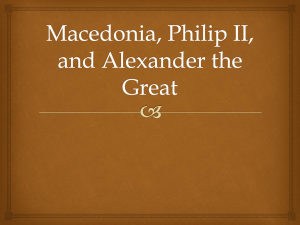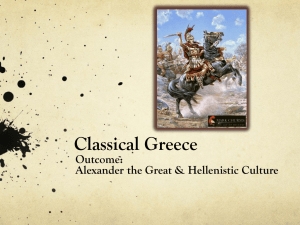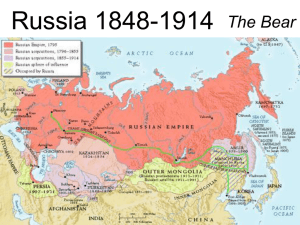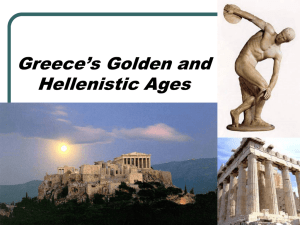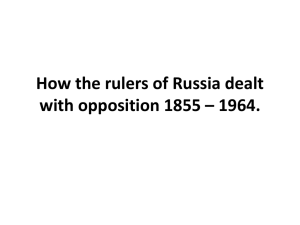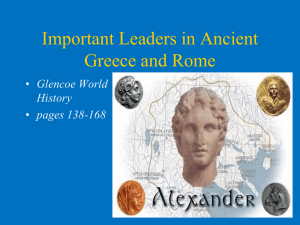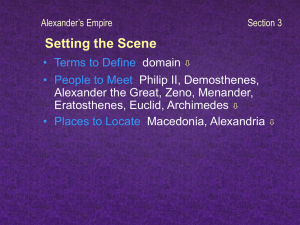01-Greece - Bruce Gore
advertisement
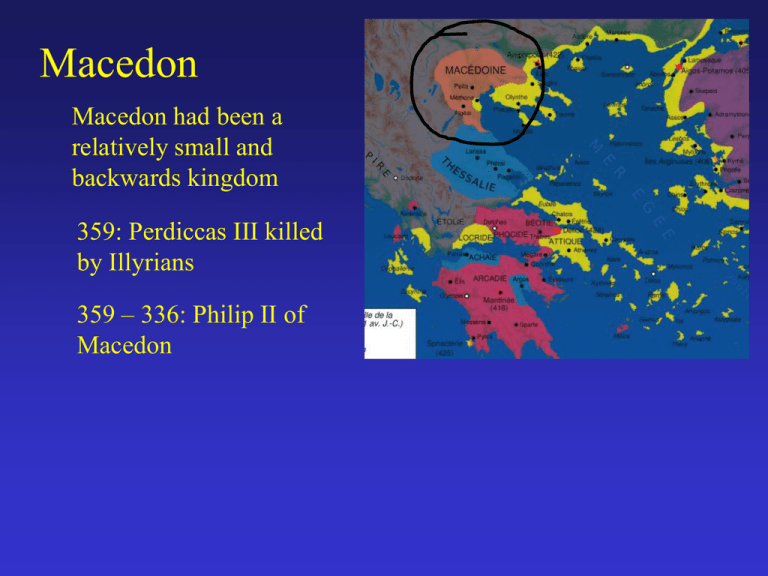
Macedon Macedon had been a relatively small and backwards kingdom 359: Perdiccas III killed by Illyrians 359 – 336: Philip II of Macedon Macedon Macedon had been a relatively small and backwards kingdom 359: Perdiccas III killed by Illyrians 359 – 336: Philip II of Macedon Expanded and consolidated Macedon Macedon Macedon had been a relatively small and backwards kingdom 359: Perdiccas III killed by Illyrians 359 – 336: Philip II of Macedon Expanded and consolidated Macedon Perfected the phalanx The Phalanx represented a war machine unmatched for discipline and efficiency and the ancient world Expansion under Philip 358: Philip attacks Illyrians 357: Philip takes Amphipolis 356: Philip takes Crenides – names it Philippi Alexander born same year 353: Controlled Greece to Themopylae 352: Demosthenes’s first Philippic Expansion under Philip 358: Philip attacks Illyrians 357: Philip takes Amphipolis 356: Philip takes Crenides – names it Philippi Alexander born same year 353: Controlled Greece to Themopylae 352: Demosthenes’s first Philippic Demosthenes: the most famous orator of the day Expansion under Philip 358: Philip attacks Illyrians 357: Philip takes Amphipolis 356: Philip takes Crenides – names it Philippi Alexander born same year 353: Controlled Greece to Themopylae 352: Demosthenes’s first Philippic 348: Olynthus fell to Philip – crucial to Athens Expansion under Philip 343: Aristotle tutored Alexander 340: Philip took control of the Hellespont Expansion under Philip 343: Aristotle tutors Alexander 340: Philip took control of the Hellespont 338: Demosthenes defeated by Alexander at Chaeronea Expansion under Philip 343: Aristotle tutors Alexander 340: Philip took control of the Hellespont 338: Demosthenes defeated by Alexander at Chaeronea 336: Philip’s first army of 10,000 resisted by Persia Philip assassinated later that year Alexander the Great The most brilliant military genius of ancient history Brought Greek culture and philosophy to the entire Near East Alluded to in Daniel Left behind the language of the New Testament Alexander the Great The most brilliant military genius of ancient history Brought Greek culture and language to the entire Near East Alluded to in Daniel Left behind the language of the New Testament Created the largest empire to date in ancient history Alexander the Great (336 – 323) 336: Quickly put down minor revolts in Greece 334: Defeated Persians at Granicus River 333: Alexander “unties” Gordian knot Alexander the Great (336 – 323) 336: Quickly put down minor revolts in Greece 334: Defeated Persians at Granicus River 333: Alexander “unties” Gordian knot The legend of the Gordian Knot Alexander the Great (336 – 323) 336: Quickly put down minor revolts in Greece 334: Defeated Persians at Granicus River 333: Alexander “unties” Gordian knot Alexander defeated Darius III at Issus Detail of Alexander Mosaic, showing Battle of Issus, from the House of the Faun, Pompeii. Alexander the Great (336 – 323) 336: Quickly put down minor revolts in Greece 334: Defeated Persians at Granicus River 333: Alexander “unties” Gordian knot Alexander defeated Darius III at Issus 332: Phoenicia, Tyre, and Jerusalem Alexander the Great (336 – 323) 336: Quickly put down minor revolts in Greece 334: Defeated Persians at Granicus River 333: Alexander “unties” Gordian knot Alexander defeated Darius III at Issus 332: Phoenicia, Tyre, and Jerusalem Alexander the Great (336 – 323) 336: Quickly put down minor revolts in Greece 334: Defeated Persians at Granicus River 333: Alexander “unties” Gordian knot Alexander defeated Darius III at Issus 332: Phoenicia, Tyre, and Jerusalem 332-331: Egypt welcomed its new Pharaoh 331: Alexander Defeated Persians at Arbella Alexander the Great (336 – 323) 334 – 331: Alexander took control of entire Persian Empire 330 – 324: Campaigns in India 323: Death of Alexander – “no more worlds to conquer”? The death of Alexander the Great, after Karl von Piloty.

